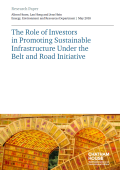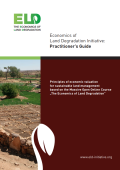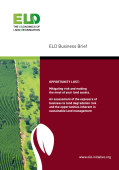
The paper The Role of Investors in Promoting Sustainable Infrastructure Under the Belt and Road Initiative examines how the multilateral development banks (MDBs) and the European bilateral development finance institutions (DFIs) encourage the use of sustainable procurement by their borrowers, and how China’s policy banks approach this issue.

This report, Decarbonising Maritime Transport, examines what would be needed to achieve zero CO2 emissions from international maritime transport by 2035.

This Economics of Land Degradation Initiative: Practitioner’s Guide reaches out to provide practitioners and decision-makers with the skills necessary to make an economic case for preventing or reversing land degradation and to adopt more sustainable land management options.

This report is a Quick guide to the report The Value of Land - Prosperous lands and positive rewards through sustainable land management.

This scoping document Opportunity Lost: Mitigating Risk and Making the Most of Your Land Assets evaluates (on a general level) the risk of land degradation on various industry sectors and discusses the impacts of land degradation on businesses using industry sectors as examples.
